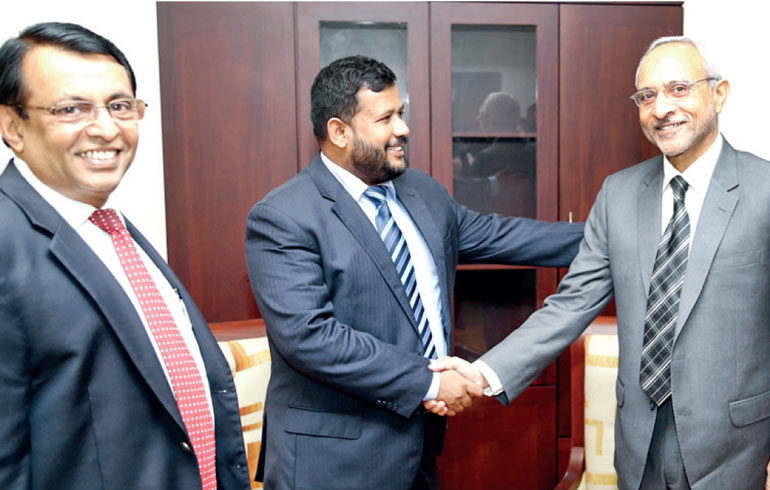Monday Feb 23, 2026
Monday Feb 23, 2026
Thursday, 28 May 2015 01:37 - - {{hitsCtrl.values.hits}}

As bilateral trade crossed $ 350 m in 2014, Sri Lanka’s second largest trading partner in SAARC, Pakistan, has reiterated that it seeks to force annual bilateral trade to $ 1 b. To this end it is aiming to wrap up the next Joint Economic Commission (JEC) session in Islamabad at the earliest.
“We want to expedite the next Joint Economic Commission to be held in Islamabad. And our new Minister of Commerce Eng. Khurram Dastgir Khan is now ready to come to Colombo before the JEC to continue the new trade initiatives agreed upon at the highest levels during April in Islamabad,” said Maj. Gen. (Rtd.) Syed Shakeel Hussain, Pakistan’s High Commissioner to Sri Lanka, on 26 May in Colombo.
High Commissioner Hussain was speaking to Minister of Industry and Commerce Rishad Bathiudeen during a courtesy call at the Minister’s office.
Pakistan is Sri Lanka’s second largest trading partner in the SAARC region after India. Total trade between the two countries jumped from $ 158 m in 2005 to $ 354 m in 2014. The Balance of Trade has always been in favour of Pakistan. The Pakistan-Lanka Free Trade Agreement came into force in June 2005. Sri Lanka’s leading exports to Pakistan in 2014 were pepper ($ 15 m), vegetable products and betel leaves ($ 12 m), natural rubber ($ 12 m), and coconut products ($ 10 m).
“Our bilateral relations go back to 1948. And we are ever grateful to Sri Lanka for the support it extended to us in 1971,” High Commissioner Hussain said.
“Our historic relations and friendship go deep down and are at the strongest levels but when it comes to trade, more work is needed. Despite the FTA being active since 1974, we have not done as much trade as we could. When I embarked on taking up the Lankan posting, our Prime Minister advised me that trade would be my sole focus while I was in Colombo. We also believe that cement, sugarcane and pharmaceuticals are key avenues of investment cooperation.
“We must integrate businesses and entrepreneurs on both sides as ways and means to expand bilateral trade. B2B exchanges involving them would be a good start for our agreed annual trade levels of $ 1 billion,” he added.
“Our President Maithripala Sirisena’s visit to Islamabad this April was very successful,” Minister Bathiudeen said.
He went on to say: “Apart from the six MoUs, the topics of discussion included sugar and cement industry cooperation, direct flights as well as the agreement to increase annual bilateral trade to $ 1 billion. We are now working towards this goal. We appreciate your suggestions on increased B2B and entrepreneur exchanges to realise $ 1 billion trade. We warmly welcome your Minister of Commerce and also believe that the forthcoming Joint Economic Commission and the Joint Working Group sessions could be held in Islamabad. I suggest we hold both sessions together in Islamabad.”
High Commissioner Hussain agreed that holding both sessions together in Islamabad was a good suggestion and stated that he would await confirmation of the dates in this regard.
During the 6 April bilateral talks between Pakistani Prime Minister Nawaz Sharif and Lankan President Maithripala Sirisena in Islamabad, both countries agreed to enhance annual bilateral trade to $ 1 billion. President Sirisena also called for an increase in people-to-people contact from both ends.
Both High Commissioner Hussain and Minister Bathiudeen also delved into other aspects of bilateral cooperation during their meeting. Also present at the discussion were S.S. Miyanawala, Secretary of the Ministry of Industry and Commerce, R.D.S. Kumararatne, Director General of the Department of Commerce and top officials from EDB.